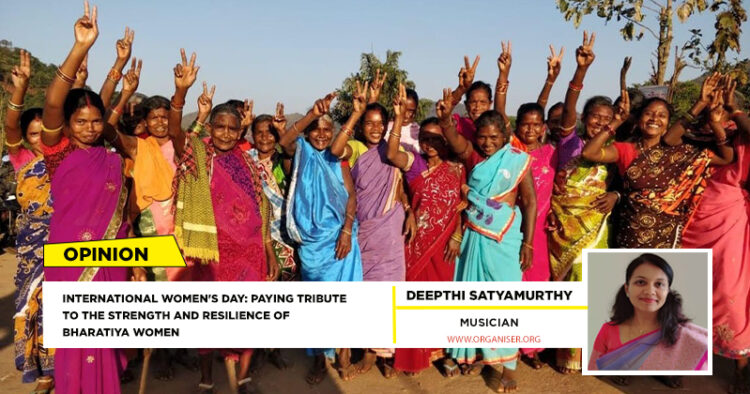International Women’s Day is celebrated on March 8 around the world to focus on gender equality, reproductive rights and violence and abuse against women.
On the contrary, in Bharat, we find a timeless wisdom encapsulated in the words: ‘Yatr naryantu poojyanthe ramanthe tathra devataaha,’ in the profound verses of the Manusmriti, translating to ‘Where women are revered, there the gods reside.’ This ancient dictum, deeply rooted in the ethos of Sanatan Dharma, illuminates the exalted status of women in our Bharaiya culture.
Across the annals of time, women have been hailed as the custodians of virtue and the nurturing force behind the fabric of society. Their role transcends mere familial ties; they are the architects of morality and the bedrock upon which civilisations flourish. From shaping the character of their offspring to weaving the intricate bonds of family, women stand as pillars of strength, resilience, and compassion.
In our cultural tapestry, a child’s identity is often intertwined with the name of their mother, and a husband’s worth is measured by the honour bestowed upon his wife. We revere our nation as ‘Mother India’ and regard nature itself as a nurturing mother, underscoring the profound reverence accorded to women in every aspect of life.
The chronicles of Indian history resound with the tales of illustrious women who defied norms and shattered barriers with their indomitable spirit. Rani Lakshmibai of Jhansi, the epitome of courage and defiance during the tumultuous days of the 1857 uprising, and Rani Durgavati, who valiantly defended her kingdom against the onslaught of tyranny, are but a few luminous examples of female valor and leadership.
From the courageous Rani Karnavati, famously known as ‘naak kaatnewali rani’, to the legendary Rani Rudrama Devi, and Rani Abbakka, who struck terror into the Portuguese 400 years ago, these remarkable women embody the essence of fortitude, resilience, and unwavering determination in adversity. Their tales serve as sources of inspiration, kindling the flames of courage and empowerment in the hearts of all who encounter them.
Beyond the realms of history and tradition, women continue to leave an indelible mark on every sphere of human endeavor. In the corridors of science, literature, politics, and the arts, their contributions have been transformative. From the pioneering work of Rani Ahilyabai Holkar in the restoration and building of temples across India to the mathematical genius of Shakuntala Devi, whether it is Arunima Sinha or the women scientists of ISRO who made prestigious Mission Chandrayaan possible, women have repeatedly demonstrated their ability to excel and innovate, transcending societal barriers and prejudices.
Today, women are excelling remarkably in every facet of life. In addition to fulfilling their roles as homemakers, they are setting new benchmarks in various fields such as arts, culture, sports, administration, and politics, among others. We are fortunate to draw inspiration from our own trailblazers like Sant Meera bai, MS Subbalakshmi, PV Sindhu, and Mary Kom.
Yet, as we celebrate the rich tapestry of our cultural heritage, we must remain vigilant against the encroachment of misguided ideologies that seek to undermine our traditional values. The western notion of women’s empowerment, tainted by shallow interpretations of secularism and liberalism, threatens to erode the very fabric of our societal ethos.
As torchbearers of our cultural legacy, it is incumbent upon us to uphold the sanctity of our traditions while embracing progress and inclusivity. Let us draw strength from the resilience of our foremothers and reaffirm our commitment to nurturing an environment where every woman is respected, revered, and empowered to realise her fullest potential.
Moreover, in the modern era, we witness a burgeoning movement towards gender equality and female empowerment. Governments and organisations around the world are increasingly recognising the importance of fostering an environment where women have equal opportunities to thrive and succeed. Initiatives aimed at promoting women’s education, economic empowerment, and political representation are gaining momentum, paving the way for a more equitable and just society.
However, despite these advancements, significant challenges remain. Gender-based violence, discrimination, and systemic barriers continue to impede the full realisation of women’s rights and potential. It is incumbent upon us, as global citizens, to confront these challenges head-on and work towards building a world where every woman and girl can live with dignity, equality, and freedom.
In conclusion, let us embrace the timeless wisdom of our Bharatiya heritage and find inspiration in the lives of individuals who exemplify impeccable integrity, refusing to yield to fear or favor. Let us endeavor to build a world where women are not only respected and revered but also empowered to carve their own paths and contribute to the progress of society. On this International Women’s Day, let us unite in our commitment to forging a future where gender equality is not merely an aspiration but a tangible reality for everyone.




















Comments